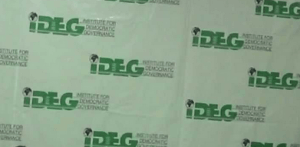IDEG urges government to release DACF on time
 The Institute of Democratic Governance (IDEG) has made a passionate appeal to the government to release the District Assemblies Common Fund (DACF) on time to ensure early completion of development projects in rural communities.
The Institute of Democratic Governance (IDEG) has made a passionate appeal to the government to release the District Assemblies Common Fund (DACF) on time to ensure early completion of development projects in rural communities.
Mr. Ewald Quaye Garr, Acting Programme Lead for Civic Empowerment for Community Action (CECA) at the IDEG, who made the appeal said, the habitual delays in the release of the fund had hindered the completion of infrastructural projects, which had been designed by the district assemblies to improve the living conditions of the people.
Speaking to the Ghana News Agency, after a tour of some development projects in the Sekyere East district, Mr Garr, pointed out that most development projects such as road networks, health facilities, school buildings among others, which were been constructed by districts assemblies across the country had halted due to lack of funds.
The tour which was conducted jointly with the Governance Issues Forum Network (GIFNeT), the district assembly and other key stakeholders was to monitor the progress of work on some selected ongoing development projects in seven cocoa growing communities in the district.
It was part of a project being implemented by IDEG in collaboration with the Mondelez International Cocoa Life Programme to build the capacities of people in cocoa growing communities to actively participate in local governance and influence decision making.
As part of the project, IDEG has instituted the GIFNet in selected cocoa growing communities in the district as a framework for promoting participatory bottom-up democracy in Ghana and also empowering citizens to participate in the making of public policy decisions at the local levels.
The communities visited were Ntunkumso, Motokrodua, Okaikrom, Odukrom, Ahensan, Apemso and Mahinso.
They inspected works on facilities such as Community-Based Health Planning and Services (CHPS), classroom blocks, mechanized boreholes and others, which were being implemented by the district assembly with part of its share of DACF.
Mr. Garr said, the participatory monitoring was part of activities aimed at strengthening citizens’ engagement and influence in the effective and efficient utilization of government resources.
He added that it was also necessary to enhance social accountability, transparency, trust and mutual commitment and responsibilities on the side of both community members and their duty bearers.
Touching on the current state of the development projects visited, Mr. Garr expressed worry about the delays and deplorable state of infrastructure and basic amenities in cocoa growing communities.
He noted that in spite of the importance of cocoa to national development, cocoa growing communities were among the poorest communities in the country, with very little or no basic social and economic infrastructure.
Mr. Garr urged the government to prioritize infrastructure development in cocoa growing communities to improve and sustain cocoa production, and also ensure prompt release of the DACF to speed up infrastructure development in underserved communities.
He however, commended the district assembly for improvement on the road network in the area and encouraged the GIFNet and community members to take responsibility for the development of their communities.
Mr. Dennis Nabare, the District Planning Officer commended IDEG for the initiative and urged community members to maintain their cooperation and engagement with the district assembly for sustainable development.
Mr. Aikins Harvery, GIFNeT chairman for the district and a native of the Ahensan, a farming community, said the participatory monitoring provided the opportunity for citizens to know how public funds were being utilized.
He called on the government and all stakeholders to respond to the development needs of cocoa growing communities to accord the people a decent standard of living as a motivation to increase and sustain cocoa production in the country.
Source: GNA
